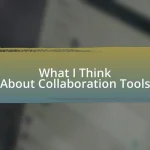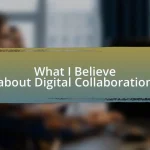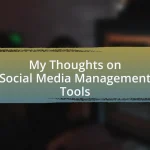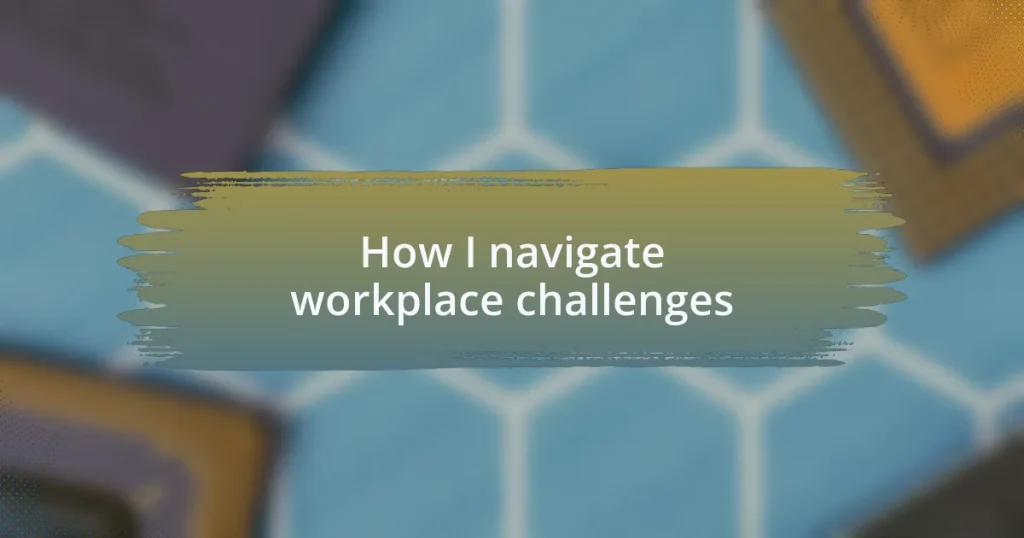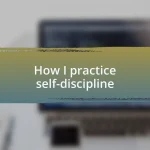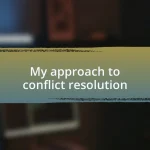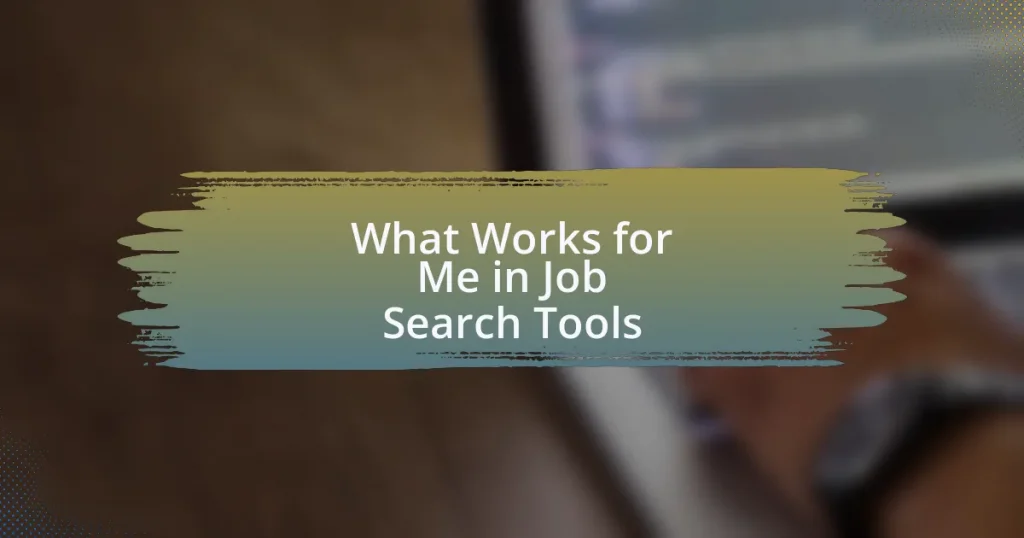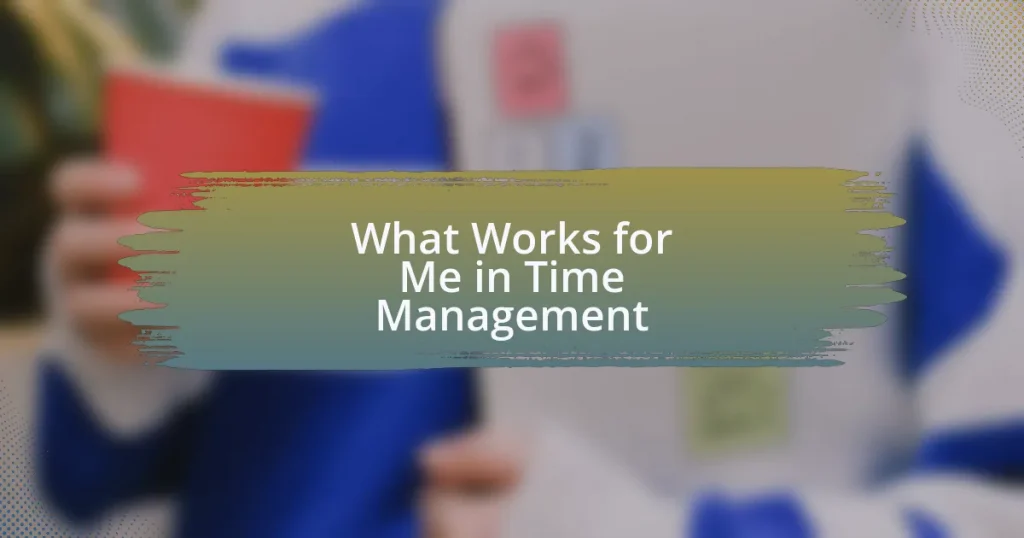Key takeaways:
- Effective communication is crucial for preventing misunderstandings and fostering teamwork, especially in remote or cross-department projects.
- Overcoming workplace challenges, such as tight deadlines and evolving technologies, leads to personal growth and stronger team connections.
- Adapting to change and embracing constructive criticism can transform professional perspectives and open new opportunities.
- Mindfulness, supportive networks, and continuous learning are essential strategies for maintaining resilience in the workplace.
Author: Charlotte Everly
Bio: Charlotte Everly is an accomplished author known for her evocative storytelling and richly drawn characters. With a background in literature and creative writing, she weaves tales that explore the complexities of human relationships and the beauty of everyday life. Charlotte’s debut novel was met with critical acclaim, earning her a dedicated readership and multiple awards. When she isn’t penning her next bestseller, she enjoys hiking in the mountains and sipping coffee at her local café. She resides in Seattle with her two rescue dogs, Bella and Max.
Understanding workplace challenges
One of the most common workplace challenges I’ve encountered is communication breakdown. I remember a time when I was part of a project where the team was scattered across different locations. It was frustrating when a simple miscommunication led to a week of wasted effort. Have you ever experienced something similar? It’s eye-opening how a lack of clarity can derail even the best plans.
Another significant challenge is the pressure of tight deadlines. I once had to deliver a web application in two weeks for a client who had an ambitious vision. The stress was palpable, and I noticed how it affected not just my productivity but also the team’s morale. How do we balance the urgency of work with our need for creativity and thoroughness? It’s crucial to find a way to manage expectations while still delivering quality results.
Lastly, navigating office politics can feel like walking through a minefield. I faced this when I was working on cross-department initiatives and realized that different teams had conflicting priorities. It taught me the importance of empathy and understanding others’ perspectives. Have you found ways to navigate these complexities? Building relationships and fostering open dialogue can be key to overcoming these obstacles.
Importance of overcoming obstacles
Overcoming obstacles in the workplace is essential for personal growth and team cohesion. I recall a project where our web application hit a critical bug just before launch. Instead of panicking, we rallied together to troubleshoot the issue. That experience taught me the power of resilience; facing challenges head-on often leads to innovative solutions.
The importance of overcoming these hurdles extends beyond individual development—it’s about the collective experience. I experienced this firsthand when a teammate was struggling with their tasks. By sharing my approach to problem-solving, we turned a difficult situation into a collaborative effort. Have you ever noticed how teamwork flourishes when challenges are shared? It’s remarkable how overcoming obstacles can foster deeper connections within the team.
Moreover, each challenge faced is a stepping stone to building confidence. I remember feeling overwhelmed when asked to present our project to upper management. However, stepping outside my comfort zone and preparing thoroughly not only improved my public speaking skills but also opened doors for my career. Isn’t it fascinating how confronting fears can lead to unexpected opportunities and strengths?
Common workplace challenges in tech
A significant workplace challenge I’ve encountered in tech is managing tight deadlines. In one situation, our team was tasked with developing a feature in a fraction of the time we usually allocate. I remember the palpable tension; it felt overwhelming. Yet, this challenge pushed us to prioritize effectively and communicate openly. Have you ever felt that rush of adrenaline that comes from working against the clock? It can be stressful but also incredibly rewarding when you rise to the occasion.
Another frequent hurdle is dealing with constantly evolving technologies. I can think of a project where we had to pivot to a new framework halfway through our timeline. I felt a mix of frustration and excitement as we scrambled to adapt. This experience reinforced for me the importance of staying flexible. How do you adapt to sudden changes in your work? Embracing new tools not only enhances your skill set but also keeps the creative spark alive.
Conflicts within teams often arise, especially in collaborative environments. I recall a spirited debate during a code review that escalated quickly. I made it a point to step back, listen, and acknowledge different viewpoints. It reminded me that conflict, when managed well, can lead to innovative solutions. Have you noticed how varied perspectives can actually enrich discussions? Embracing these differences can transform challenges into catalysts for growth.
Strategies for effective problem solving
When faced with challenges, the first strategy I employ is breaking down the problem into smaller, manageable parts. I remember a time when our team faced an overwhelming bug that seemed insurmountable. By isolating each component, we tackled one issue at a time, which made the solution clearer and less daunting. Have you ever tried dissecting a complex problem? It often reveals paths you didn’t see before.
Another effective approach is fostering collaboration among team members. In a recent project, I organized a brainstorming session where everyone could share their insights freely. The atmosphere was charged with energy, and it surprised me how a simple discussion led to a breakthrough idea. Have you seen how collective thinking can amplify creativity? I strongly believe that harnessing diverse perspectives helps in generating more robust solutions.
Lastly, I find it helpful to maintain a positive mindset even in tough situations. There was a time we faced major setbacks on a crucial deadline, and while the pressure mounted, I encouraged the team to focus on the progress we made, not just the obstacles. This shift in perspective not only lifted morale but also sparked renewed motivation. Have you experienced the transformative power of optimism in problem-solving? I’ve learned that a resilient attitude can make all the difference in finding effective solutions.
Personal experiences with workplace issues
Reflecting on my time as a junior developer, I encountered a difficult situation with a senior colleague who often dismissed my ideas during team meetings. It stung to see my contributions overlooked, and I initially felt hesitant to voice my thoughts. But I learned to approach these interactions with an open mind, asking for feedback on my proposals and showing appreciation for their expertise. This shift not only fostered a better working relationship but also made me more confident. Have you ever felt sidelined in discussions?
There was an instance during a crucial phase of a project when our entire team faced mounting stress from conflicting deadlines. Tension rose, and I found myself on the brink of burnout. Rather than keep quiet, I decided to have an honest conversation with my manager about my workload. To my surprise, they appreciated my transparency and were willing to adjust priorities. This taught me the importance of advocating for myself. Have you ever taken that brave step to communicate your limits?
In another project, our group struggled with differing opinions on design choices, which led to heated debates. I remember feeling overwhelmed, as I wanted to maintain harmony but also provide my input. Instead of retreating or compromising my ideas, I initiated a feedback loop where everyone could weigh in anonymously on the designs. It was a revelation to see how this small change alleviated the strain and resulted in a more cohesive final product. Have you considered how varied feedback can change the direction of a project?
Lessons learned from my journey
One significant lesson I learned came during a time when a tight team dynamic suddenly fractured over project responsibilities. I vividly remember feeling a mix of anxiety and frustration as misunderstandings piled up. It struck me that clear communication was essential; a simple check-in meeting could have clarified each person’s role, preventing the conflict altogether. Have you considered how much smoother teamwork can be with just a bit of proactive communication?
Another moment that profoundly impacted me was when a project I was passionate about faced harsh criticism from stakeholders. At first, I felt defensive and disheartened, questioning my skills and judgment. However, I realized that taking constructive criticism is a learning opportunity. By embracing feedback, I evolved my work and, in turn, gained the respect of my peers. Can you recall a time when criticism transformed your perspective in a meaningful way?
Finally, I’ll never forget the day our team had to pivot mid-project due to sudden market changes. Initially, I felt unprepared and anxious about the shifting landscape. However, this experience taught me how critical adaptability is in the tech world. Embracing change rather than resisting it opened up pathways I hadn’t imagined before. Have you ever found that a forced change led to unexpected opportunities?
Tips for maintaining workplace resilience
When it comes to maintaining resilience at work, I find mindfulness techniques to be incredibly effective. During particularly stressful periods, I often schedule short breaks to focus on my breathing or take a brief walk. These moments of mindfulness not only clear my head but also allow me to approach challenges with renewed energy and perspective. Have you tried incorporating mindfulness into your daily routine?
Another strategy I employ is building a supportive network within the team. I recall a time when collaboration helped me through a tough deadline. By sharing our challenges and organizing quick brainstorming sessions, we not only resolved issues faster but also fostered trust among team members. It’s amazing how knowing that others have your back can make a world of difference in your resilience.
Lastly, I prioritize personal growth through continuous learning. I remember diving into online courses during a slow project phase, transforming my skills and boosting my confidence. Exploring new technologies or methodologies can shift your mindset from feeling stagnant to feeling empowered. Have you considered how expanding your knowledge could help you navigate workplace difficulties?





